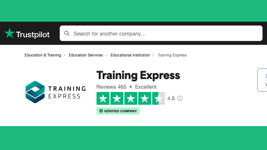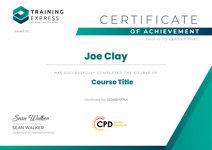Navigating the Intersection of Petroleum and the Environment
CPD Accredited | Free PDF & Hardcopy Certificate included | Free Retake Exam | Lifetime Access
Training Express Ltd
Summary
- Digital certificate - Free
- Hard copy certificate - Free
- Exam(s) / assessment(s) is included in price
- Tutor is available to students
Add to basket or enquire
Overview
The petroleum industry is a major part of the global economy. It provides the energy that powers our cars, homes, and businesses. However, the industry also has a significant impact on the environment. Our Introduction to Petroleum Engineering and Exploration course will explore the intersection of petroleum and the environment. It will discuss the environmental impact of the industry and the challenges of developing and producing oil and gas sustainably. The Introduction to Petroleum Engineering and Exploration course will also explore the future of energy and the role of the petroleum industry in a sustainable energy future.
Learning Outcomes
- Gain fundamental knowledge of petroleum geology and reservoir dynamics.
- Understand the intricacies of drilling contracts, rig crew and the drilling process.
- Develop a comprehension of well intervention and flow in well tubing.
- Acquire insights into the environmental impact of petroleum operations.
- Explore future energy trends and the role of petroleum in that context.
- Appreciate the interdisciplinary nature of petroleum engineering, combining scientific principles, environmental considerations and economic implications.
CPD
Course media
Description
This course opens a door into the fascinating petroleum world, beginning with a comprehensive introduction that lays a robust foundation. Next, you'll delve into petroleum geology and discover reservoir rock and fluid complexities. Next, practical knowledge of reservoir engineering for oil and gas reservoirs, as well as flow in good tubing and healthy intervention, will be gained. The latter part of the course offers a deep understanding of drilling contracts, rig crew, the drilling rig, and its systems and processes.
Critical environmental issues linked to petroleum are a central focus of this course. It concludes with a thoughtful exploration of future energy trends, including the evolving role of petroleum within this landscape. This curriculum offers a balanced perspective on petroleum engineering and environmental stewardship.
Certification
Upon successful completion of the course, all learners will be eligible to receive a certificate titled Introduction to Petroleum Engineering and Exploration to acknowledge their achievement. We are delighted to offer two formats for your certificate: PDF and Hardcopy.
- PDF Certificate: This digital version of your certificate will be available for you to download and print for totally FREE.
- Hardcopy Certificate (UK Delivery): For those who wish to have a physical token of their achievement, we offer a high-quality, printed certificate. This hardcopy certificate is also provided free of charge. However, please note that delivery fees apply. If your shipping address is within the United Kingdom, the delivery fee will be only £3.99.
- Hardcopy Certificate (International Delivery): For all international addresses outside of the United Kingdom, the delivery fee for a hardcopy certificate will be only £10.
Who is this course for?
This course is suitable for individuals considering a career in the petroleum industry, specifically in areas related to drilling, reservoir engineering and environmental management. However, it would be equally beneficial for individuals already employed in the sector seeking to broaden their knowledge and understanding of the petroleum-environment intersection. Additionally, it would serve well for policy-makers, regulators, and those in the academic world interested in the energy sector, particularly in petroleum and its environmental implications.
Career path
- Reservoir Engineer - £45K to £70K/year
- Petroleum Geologist - £32K to £60K/year
- Drilling Engineer - £35K to £65K/year
- Well Intervention Specialist - £40K to £75K/year
- Environmental Compliance Officer (Oil and Gas) - £30K to £55K/year
Questions and answers
Currently there are no Q&As for this course. Be the first to ask a question.
Certificates
Digital certificate
Digital certificate - Included
Hard copy certificate
Hard copy certificate - Included
Hardcopy Certificate (UK Delivery):
For those who wish to have a physical token of their achievement, we offer a high-quality, printed certificate. This hardcopy certificate is also provided free of charge. However, please note that delivery fees apply. If your shipping address is within the United Kingdom, the delivery fee will be only £3.99.
Hardcopy Certificate (International Delivery):
For all international addresses outside of the United Kingdom, the delivery fee for a hardcopy certificate will be only £10.
Reviews
Currently there are no reviews for this course. Be the first to leave a review.
Legal information
This course is advertised on reed.co.uk by the Course Provider, whose terms and conditions apply. Purchases are made directly from the Course Provider, and as such, content and materials are supplied by the Course Provider directly. Reed is acting as agent and not reseller in relation to this course. Reed's only responsibility is to facilitate your payment for the course. It is your responsibility to review and agree to the Course Provider's terms and conditions and satisfy yourself as to the suitability of the course you intend to purchase. Reed will not have any responsibility for the content of the course and/or associated materials.



